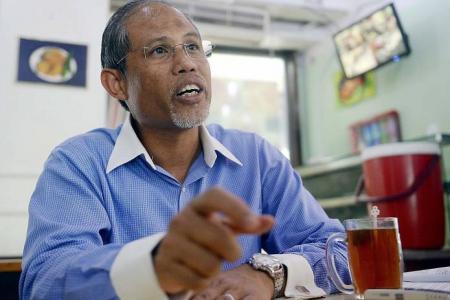Youth think some drugs are safer to experiment with: Masagos
Young people here have the worrying perception that some drugs are safer to experiment with, said Senior Minister of State for Home and Foreign Affairs Masagos Zulkifli.
The interview with Berita Harian, which was published yesterday, was done as a prelude to the Asean Ministerial Meeting on Drug Matters early next month in Jakarta, which will discuss drug issues in the region.
Below are the main points that Mr Masagos touched on.
1 WRONG PERCEPTION TOWARDS PARTY DRUGS
Referring to a finding by the National Council Against Drug Abuse, Mr Masagos said youth here have the wrong perception that some drugs are safer to experiment with.
He said these party drugs are marketed as being non-addictive, but their effects are far from that.
Research has shown that these drugs can cause addiction, and long-term usage can lead to health issues such as brain and kidney damage and could even be fatal in some cases.
Mr Masagos said: "There are no recreational drugs. Drugs that are abused are definitely dangerous.
"In fact, drugs like meth (methamphetamine) and new psychoactive substances (NPS) are dangerous because we do not know their exact dosage.
"They are also produced using chemicals - it is as though we are eating plastics."
Mr Masagos added that the Government is also concerned over the rise of cannabis users.
The number of new cannabis users who were arrested has jumped 37 per cent from 93 in 2012 to 127 last year.
2 CHANGE IN DISTRIBUTION METHOD
Mr Masagos was quoted as saying that drugs like Ice, cannabis and NPS are specifically targeted at the young.
What made it worse was that these drugs are also readily available on the Internet.
Moving away from traditional syndicates, young people now get their supply of drugs from small groups made up mainly of peers.
Among the Government's strategies to overcome this are education for prevention and getting closer to young people via various platforms, such as social media, youth-friendly activities and forums, said Mr Masagos.
The Government will also come down hard on those who abuse drugs, regardless of their age or type of drug.
He said: "We will nab them and they will be punished. They need to undergo rehabilitation and detoxification. Basically, it will affect their lives."
3 SINGAPORE AS A DRUG TRANSIT POINT
Drugs from countries like Pakistan and Africa arrive here before they are sent to countries like Japan and Indonesia. Mr Masagos said: "Singapore becomes an attractive choice because we receive a huge amount of goods. What we receive in a day is equal to what some countries receive in a month.
"But Singapore takes this seriously. We are concerned with issues related to ingredients used to produce drugs.
"The Government does not want Singapore to become a hub (for drug trafficking) because they think we are not able to control the situation due to the sheer amount of goods that we receive."
Singapore's location as a global transit point has made combating drug trafficking complicated.
But the Government works closely with other countries to overcome it.
For example, the close working relationship between the Central Narcotics Bureau and Malaysia's Federal Narcotics Crime Investigation Department resulted in a drug bust on Nov 6 worth RM5.2 million (S$2 million).
Mr Masagos said: "I cannot explain in detail. But there has been much information sharing between Singapore and other countries. Asean, as a principle, shares the mutual aim to banish the drug menace."
4 MORE YOUNG DRUG ABUSERS COME FROM WELL-TO-DO FAMILIES
As cannabis and party drugs are not cheap, many drug abusers come from more well-off families.
Mr Masagos said: "The situation has changed. Before this, heroin was targeted at broken families because the drug trafficker or the syndicate was certain the drug addict would not tell on them.
"Now, drugs are supplied by peers. And the users are not from broken families. They come from well-to-do families, study at polytechnics and ITEs (Institute of Technical Education). This is worrying."
He also revealed that 85 per cent to 90 per cent of young drug abusers are studying at post-secondary institutions.
"They are healthy youth who are still schooling but may have mixed with the wrong company or are tricked into taking drugs or have the wrong perception about drugs," said Mr Masagos.
5 DIFFERENT APPROACH NEEDED TO TACKLE THE DRUG MENACE
Mr Masagos said the Malay community needs to take into account the new emerging trends when dealing with the issue, hence the need for a two-pronged approach.
For example, a Community Rehabilitation Centre was introduced last year to help young drug abusers so that they do not mix with the more seasoned drug addicts at the Drug Rehabilitation Centre to reduce the possibility of them being influenced.
Parental involvement and community support are also crucial in the rehabilitation process.
In this respect, Mr Masagos is happy that more Malay volunteers have come forward to help.
He revealed that the ratio of Malay/Muslim volunteers to drug addicts was one to 113 in 2008 and the number has now dropped to one to 21.
Many of them volunteered through grassroots organisations and organisations like Pertapis, he said.
The Government does not want Singapore to become a hub (for drug trafficking) because they think we are not able to control the situation due to the sheer amount of goods that we receive.
- Senior Minister of State for Home and Foreign Affairs Masagos Zulkifli
Get The New Paper on your phone with the free TNP app. Download from the Apple App Store or Google Play Store now



